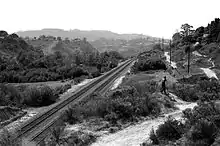Rose Canyon Fault
The Rose Canyon Fault is a right-lateral strike-slip fault running in a north-south direction through San Diego County, California.[1]

Extent
The Rose Canyon Fault is about 30 km (19 mi) in length. It starts in the Mission Valley area and heads past Mt. Soledad and La Jolla into the Pacific Ocean where it joins other faults such as the Oceanside Fault.[2]
Current state

Not much is known about the Rose Canyon fault, though its slip-rate is thought to be 1.1 mm/year.[1]
The Rose Canyon Fault has sustained at least one late Holocene rupture, with the date of the earthquake estimated to be after AD 1450 and most likely prior to construction of the San Diego Mission in 1769, as a large historical Rose Canyon earthquake would likely have destroyed that mission.[3] The last earthquake believed to have occurred on the fault occurring on May 27, 1862, which was around magnitude 6;[4] however, its association with the Rose Canyon Fault is debatable.[5]
The Rose Canyon Fault has garnered more attention because it runs through such highly populated areas and was formerly thought not to be much of a threat.[6][7] Some geophysicists, such as Scripps Institution of Oceanography researcher Jeff Babcock, have hypothesized that a concentrated earthquake involving the Rose Canyon, Oceanside, and Newport–Inglewood faults could result in an earthquake up to magnitude 7.6 on the moment magnitude scale.[2] A 2017 study concluded that, together, the Newport–Inglewood Fault and Rose Canyon Fault could produce an earthquake of 7.3 or 7.4 magnitude.[8]
References
- Hart, E.W., Bryant, W.A., Wills, C.J., Treiman, J.A., and Kahle, J.E., "Summary Report: Fault Evaluation Program, 1987–1988, Southwestern Basin and Range Region and Supplemental Areas.", Department of Conservation, Division of Mines and Geology Open-File Report, 1989. Retrieved March 2, 2010.
- Monroe, Robert, "Finding Faults", 2002. Retrieved March 2, 2010.
- "Southern California Edison, Paleoseismic Assessment of the Late Holocene Rupture History of the Rose Canyon Fault in San Diego", December 2012.
- De Wyze, Jeannete (March 2, 2000). "Earthquake San Diego Danger Zones" (PDF). San Diego Reader. Retrieved October 4, 2016.
Robbins, Gary (May 26, 2012). "SD marks 150th anniversary of biggest quake". San Diego Union Tribune. Retrieved October 4, 2016. - Glenn Roquemore (April 1, 1997). The Seismic Risk in the San Diego Region: Special Focus on the Rose Canyon Fault Systems: Workshop Proceedings. DIANE Publishing. p. 6. ISBN 978-0-7881-4262-8.
- Lin II, Rong-Gong (2020-03-04). "San Diego faces critical earthquake danger from fault long believed to be inactive". Los Angeles Times. Retrieved 2020-03-05.
- "San Diego Earthquake Scenario". San Diego Regional Chapter, Earthquake Engineering Research Institute. Retrieved 2020-03-05.
- "Study: California fault could cause magnitude-7.4 quake". The Washington Post. San Diego, California. Associated Press. March 7, 2017. Retrieved March 8, 2017.
Sources
- Magistrale, H. (1993), "Seismicity of the Rose Canyon fault zone near San Diego, California", Bulletin of the Seismological Society of America, Seismological Society of America, 83 (6): 1971–1978
Further reading
- Kennedy, Michael P. (1975). Geology of the San Diego metropolitan area, California. California Division of Mines and Geology.